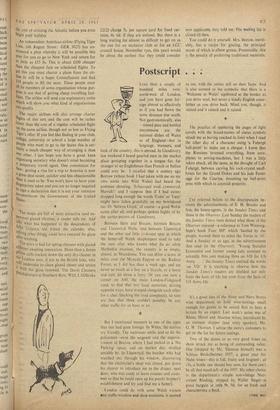Postscript
• • •
LESS than a couple of hundred miles west- north-west of London, and you have gone for- eign almost as effectively as if you had flown the same distance due south. Not gastronomically, alas —tinned peas and bottled mayonnaise are , the national dishes of Wales as of England—but in language, manners, and look of the country, this is abroad. In Llandovery last weekend I heard gnarled men in the market place gossiping together in a tongue far, far stranger to an Englishman than French or Italian could ever be: I recalled that a century ago Borrow (whose book I had taken with me on my own sortie into Wild Wales) had heard the postman shouting. 'Sebastopol wedi cymmeryd. Hurrah!' and I suppose that if I had eaves- dropped long enough the words 'Cuba' or 'Laos' might have fallen gratefully on my bewildered car. Or 'Selwyn Lloyd,' of course—a good Welsh name after all, and perhaps spoken highly of by the surtax-payers of Liandovery.
Between there and Brecon; between Brecon and Llanwrtyd Wells; and between Llanwrtyd and the other sad little 'ii-deviant spas at which the better-off Welsh shopkeepers used to take the cure after who knows what fin de siecle Methodist excesses, the country is as empty, almost, as Macedonia. You can drive a score of miles over the 'Mynydd Eppynt or the Radnor Forest, as I did less than a week ago, and see never so much as a boy on a bicycle, or a horse and cart, let alone a lorry. Or you can turn a corner on A40, the main London-Fishguard road, to find that two local motorists, driving opposite ways, have stopped alongside each other for a chat. blocking' the road completely, so sure are they that there couldn't possibly be any other traffic for an hour or so.
But I mentioned manners as one of the signs that one had gone foreign. In Wales, the natives are friendly. The waitresses smile, and so do the policemen--even the sergeant and the superin- tendent in Brecon, where I had parked in a 'No Parking' space, and on market day, strolled amiably by. In Llanwrtyd, the butcher who had watched me, through his window. discovering that the electrician's shop was, closed, put down his cleaver to introduce me to the draper, next door, who was ready to leave counter and custo- mer so that he could open up his poorly brother's establishment and try and find me a battery.
London could do with some Welsh waiters and traffic-wardens and shop-assistants. it seemed to me, with the smiles still on their faces. And it also seemed to me symbolic that there is a 'Welcome to Wales' signboard at the border as you drive west, but never a kindly English come- hither as you drive back. Mind you, though, it rained and it rained and it rained.
The practice of spattering the pages of light novels with the brand-names of status symbols struck me as having reached its limit when I read the other day of a character using 'a Faberge ball-point' to make out a cheque. I know that the Russians invented everything, from aero- planes to sewing-machines, but I was a little taken aback, all the same, at the thought of Carl Faberge, between carving his rock-crystal snuff- boxes for the Grand Dukes and his jade Easter eggs for the Czarina, dreaming up ball-point pens with which to astonish posterity.
* rye referred before to the discrepancies be- tween the advertisements of E. H. •Brdoks and Sop, the house-agents,, in the Sunday Times and those in the Observer. Last Sunday the readers of the.,Sunday Times were denied what those of the Observer enjoyed—a reference to Tom Wintring- ham's book Your MP, which. 'heeded by the people, warned them to reject the Tories in '45.! And a Sunday or so ago, in the, advertisement that read (in the Observer): 'Young Socialist Economist and former young lady assistant to scientific film unit making films on VD for US Army . . .' the Sunday Times omitted the words 'on VD.' It is touching to observe how the Sunday Tintes's readers are shielded not only from the facts of life but even from the facts of US Army life.
It's a good idea of the Army and Navy Stores wine department to hold wine-tastings small enough for guests to be seated first to hear a lecture by an expert. Last week's series was of Rhine, Mosel and Alsatian wines, introduced by an eminent shipper (and witty speaker), Mr. G. W. Thoman. I advise the store's customers to get on the list for future tastings.
Two of the dozen or so' very good wines on show struck me as being of outstanding value. One (shipped by Mr. Thoman himself) was a Schloss BOckelheimer 1957, a great year for Nahe wines—this is full, fruity and fragrant: at 13s. a bottle one should buy now, for there can't be all that much left of the 1957. My other choice is the department's simple non-vintage Nier- steiner Riesling, shipped by Walter Siegel—a great bargain at only 9s. 9d. for so fresh and characteristic a hock.
CYRIL RAY














































 Previous page
Previous page